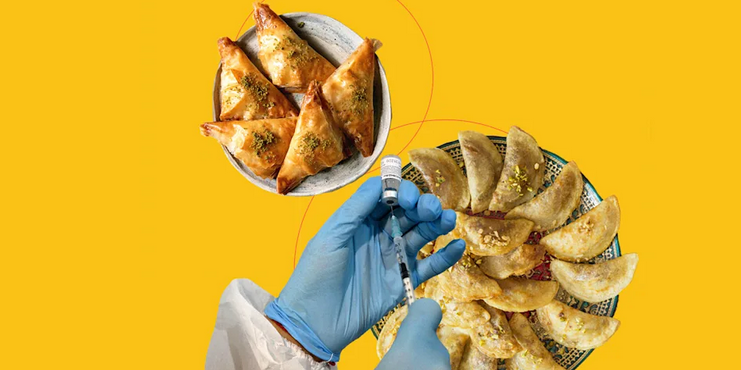Myra Ali
According to a study published in the British Journal of Psychiatry Open, the pandemic has quadrupled mental health issues in frontline health workers. According to the study, 21% of healthcare workers reported high levels of depression, compared with 5% pre-pandemic.
One of these frontline workers is Mohammed Harb, a pharmacist working in North London. He starts his day by treating patients at his pharmacy, then in the afternoon working at a COVID-19 vaccination centre leading a team to ensure the proper preparation and administration of vaccines.
Mohammed admits that working on the frontline has really affected his mental health, especially as a lot of patients just want to “vent and talk about the trauma they’ve been through.” He recalls a patient who became incredibly emotional when he spoke about being in a coma for over a month due to Coronavirus.
“He had told his wife to make funeral arrangements as he thought he wasn’t going to make it,” he tells me.
Hearing about and seeing the suffering of others on a daily basis is bound to affect the mental health of frontline workers just like Mohammed. So, what do you do in situations like this, and is it truly possible to switch off and wind down when you’re on the frontline of one of the biggest global pandemics in history?
Forget the gym, or reading a book, Mohammed sought comfort in baking in order to manage the stressful parts of his job. And his new passion has given him a lot of pleasure away from the daily grind.
“It’s a way to keep my brain active, focused and engaged whilst also being fun and rewarding. I’ve been able to see my own progression in baking and creating ideas,” he says.
“Working as pharmacist I work long hours. You have to be really meticulous and focused as you are in charge of someone’s health,” he says. “Of course, this is rewarding, and you feel good, but it is also very tiring. By the time I get home it’s 8pm and my kids are already in bed. I bake when the house is quiet, it is impossible to bake if you have two toddlers around, they’re not the best sous chefs!”
Often at midnight, when the rest of the world is sleeping, Mohammed will grab his ingredients and pre-heat his oven, and get to work, baking a variety of desserts, from macarons to pastries. Thanks to Mohammed’s Lebanese roots, there will always be the taste of Lebanon at the heart of his baking, from rose petal cookies jewelled with pistachios to halwa ganache cakesicles.
“I love researching new ideas, I use unique flavours from the village from where my family is from.”
His favourite Lebanese desserts include baklawa and Atayef (fried pastry usually covered in syrup and filled with crushed walnuts or Lebanese clotted cream).
Mohammed’s passion for baking has even secured him a side project creating recipes for renowned, award-winning Lebanese chef Lina Saad’s next cookbook.
Despite his baking success, Mohammed admits he used to be too embarrassed to take things into work but as he grew in confidence his colleagues now get to enjoy his desserts, too.
But will he become a full-time baker?
“It would be a dream if I could make it work!” he says.
“I’ve always loved shows like Bake Off and I’d think I’d love to go on there but there’s still that self-doubt which makes me think ‘don’t be silly, you have a job in healthcare!’ But for now I’m just keeping motivated and hope that people continue to enjoy my desserts!”
“I think anyone working during the pandemic have been on the frontline. It’s not just healthcare workers, all the teachers out there, the bus drivers, police and emergency services, they’re all amazing!”
“Work can sometimes take over our lives, but just taking that time out to look after yourself is so important. Whether that be through talking to someone, doing nothing at all and unwind, or like me… bake!”
Source: https://uk.style.yahoo.com/returning-lebanese-roots-kitchen-helped-163500924.html






Be the first to comment on "“Returning To My Lebanese Roots In The Kitchen Has Helped Me Manage The Stress Of Working On The Frontline”"